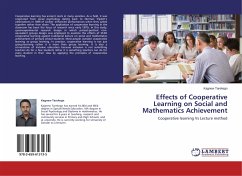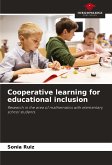George Jacobs, Wan Inn Loh, Michael A Power
Teacher's Sourcebook for Cooperative Learning
Practical Techniques, Basic Principles, and Frequently Asked Questions
George Jacobs, Wan Inn Loh, Michael A Power
Teacher's Sourcebook for Cooperative Learning
Practical Techniques, Basic Principles, and Frequently Asked Questions
- Broschiertes Buch
- Merkliste
- Auf die Merkliste
- Bewerten Bewerten
- Teilen
- Produkt teilen
- Produkterinnerung
- Produkterinnerung
`The authors reveal considerable wealth of experience as teachers and as users of CL. This will be a very successful book' - Jon A Scaife, Lecturer in Education, School of Education, University of Sheffield The authors of this volume define cooperative learning as "principles and techniques for helping students work together more effectively." Teachers of every level will find this book full of useful ideas on how the power of student-student cooperation can enliven their classrooms. The authors share eight key principles of creating effective and efficient cooperative learning (CL), along…mehr
Andere Kunden interessierten sich auch für
![Teacher's Sourcebook for Extensive Reading Teacher's Sourcebook for Extensive Reading]() George M. JacobsTeacher's Sourcebook for Extensive Reading63,99 €
George M. JacobsTeacher's Sourcebook for Extensive Reading63,99 €![Teacher's Sourcebook for Extensive Reading (Hc) Teacher's Sourcebook for Extensive Reading (Hc)]() George M. JacobsTeacher's Sourcebook for Extensive Reading (Hc)108,99 €
George M. JacobsTeacher's Sourcebook for Extensive Reading (Hc)108,99 €![The Practice Of Cooperative Language Learning The Practice Of Cooperative Language Learning]() Teferi TerefeThe Practice Of Cooperative Language Learning39,99 €
Teferi TerefeThe Practice Of Cooperative Language Learning39,99 €![Effects of Cooperative Learning on Social and Mathematics Achievement Effects of Cooperative Learning on Social and Mathematics Achievement]() Kagnew TarekegnEffects of Cooperative Learning on Social and Mathematics Achievement36,99 €
Kagnew TarekegnEffects of Cooperative Learning on Social and Mathematics Achievement36,99 €![Cooperative learning for educational inclusion Cooperative learning for educational inclusion]() Sonia RuizCooperative learning for educational inclusion39,99 €
Sonia RuizCooperative learning for educational inclusion39,99 €![The Effectiveness of Cooperative Learning NHT at SMP 20 Tangerang The Effectiveness of Cooperative Learning NHT at SMP 20 Tangerang]() Destiani RahmawatiThe Effectiveness of Cooperative Learning NHT at SMP 20 Tangerang17,99 €
Destiani RahmawatiThe Effectiveness of Cooperative Learning NHT at SMP 20 Tangerang17,99 €![The Role of Cooperative Learning in Bullying Prevention The Role of Cooperative Learning in Bullying Prevention]() Sergio López AntónThe Role of Cooperative Learning in Bullying Prevention20,99 €
Sergio López AntónThe Role of Cooperative Learning in Bullying Prevention20,99 €-
-
-
`The authors reveal considerable wealth of experience as teachers and as users of CL. This will be a very successful book' - Jon A Scaife, Lecturer in Education, School of Education, University of Sheffield The authors of this volume define cooperative learning as "principles and techniques for helping students work together more effectively." Teachers of every level will find this book full of useful ideas on how the power of student-student cooperation can enliven their classrooms. The authors share eight key principles of creating effective and efficient cooperative learning (CL), along with a variety of CL techniques and examples of how to use them. Research has shown that by participating in CL, students can benefit in the following areas (supporting research is described in the Resources): - Improved academic achievement - More active involvement in learning by students regardless of past achievement level or individual learning needs - Increased student responsibility for their own learning - Improved collaborative skills - Improved student attitudes toward learning, school, peers, and self - Greater opportunities for the teacher to observe and assess student learning At the same time teachers are learning a new way to teach, students are learning a new way to learn - along with the content being taught. Just as students can learn better when working with peers, so too can teachers; the benefits of teachers working together with colleagues are also described.
Hinweis: Dieser Artikel kann nur an eine deutsche Lieferadresse ausgeliefert werden.
Hinweis: Dieser Artikel kann nur an eine deutsche Lieferadresse ausgeliefert werden.
Produktdetails
- Produktdetails
- Verlag: Corwin
- Seitenzahl: 186
- Erscheinungstermin: 1. Juli 2002
- Englisch
- Abmessung: 280mm x 216mm x 10mm
- Gewicht: 484g
- ISBN-13: 9780761946090
- ISBN-10: 0761946098
- Artikelnr.: 21619529
- Herstellerkennzeichnung
- Produktsicherheitsverantwortliche/r
- Europaallee 1
- 36244 Bad Hersfeld
- gpsr@libri.de
- Verlag: Corwin
- Seitenzahl: 186
- Erscheinungstermin: 1. Juli 2002
- Englisch
- Abmessung: 280mm x 216mm x 10mm
- Gewicht: 484g
- ISBN-13: 9780761946090
- ISBN-10: 0761946098
- Artikelnr.: 21619529
- Herstellerkennzeichnung
- Produktsicherheitsverantwortliche/r
- Europaallee 1
- 36244 Bad Hersfeld
- gpsr@libri.de
George M. Jacobs has a PhD in Educational Psychology from the University of Hawaii and a master's degree in Linguistics from the University of Illinois-Chicago. He has been teaching courses on cooperative learning since 1988. He has published many articles on the topic and is also a coauthor of Learning Cooperative Learning via Cooperative Learning: A Sourcebook of Lesson Plans for Teacher Education (1997). He is a member of the Executive Board of the International Association for the Study of Cooperation in Education and editor of its newsletter. He also specializes in second-language learning and helped compile an annotated bibliogra-phy of works on group activities in second-language instruction. Contact him at gmjacobs@ pacific.net.sg.
Introduction What Is Cooperative Learning? The Benefits of Cooperative Learning How to Get the Most From This Book About the Authors Part I: Getting Started With Cooperative Learning 1. Principle: Cooperation as a Value How can I get my class started using cooperative learning (CL)? What classroom management techniques might work well with CL? How might the room be arranged for CL? 2. Principle: Heterogeneous Grouping How can I form cooperative groups? How can I help my students work together smoothly? What are some strategies for team building? 3. Principle: Positive Interdependence What is positive interdependence? How can I help my students develop positive interdependence? How can we encourage an "all for one, one for all" spirit among students? 4. Principle: Individual Accountability How can I encourage all students to participate and learn? How can I help students learn to take responsibility for their group? 5. Principle: Simultaneous Interaction How can I give students lots of opportunities to express their ideas? Should students report on their group work to the whole class? How can I encourage students to explain their thinking to their group? 6. Principle: Equal Participation How can I promote equal participation in groups? How might CL help with differences in student ability levels? What about the students whose main strengths do not lie in academic skills? 7. Principle: Collaborative Skills Is it necessary to teach students how to cooperate? Can students learn collaborative skills while learning content, or does it have to be done separately? How might cooperative learning help students develop thinking skills? 8. Principle: Group Autonomy How can I help groups become more independent of the teacher? How much should I intervene when students are working in their CL groups? What is the teacher
s role when students have become more autonomous? 9. Assessment in Cooperative Learning How can I assess learning in cooperative groups? What are my options for grading students, and what are the pros and cons of giving all group members the same grade? How might I involve students in assessing themselves and each other? What about assessing how cooperative students are? Part II: Frequently Asked Questions About Cooperative Learning 10. Preparing Our Classes for Cooperative Learning What size should groups be? What if there is an uneven number of students? How long should CL groups stay together? What if students want to choose their own partners? How can CL work when students don
t believe they can learn from their peers? Should anything special be done when groups end? 11. Managing Cooperative Learning Classes Isn
t CL a recipe for behavioral chaos? Should I use time limits with group tasks? Won
t there be a lot of disruption and wasted time while students are moving into groups? How can I quickly get students
attention when they are working in groups? How do you deal with groups that are too noisy? What if some groups are not carrying out the task or activity properly? Is it a problem when groups finish at different times? How can group reporting be a learning experience for everyone in the class? How can I listen in as students are working together in their groups? 12. Creating CL Tasks How often should I use CL? How can I find the time necessary to prepare structured CL activities? How are CL lessons different from teacher-fronted lessons? Won
t group activities take too long? Won
t students complain about using the same CL technique, or even using CL, again and again? What if CL tasks are too difficult for students of different ability levels? 13. Enhancing Thinking When Using CL How can I encourage students working in groups to show creativity or other evidence of higher-order thinking? How can I ensure that group members avoid reaching quick consensus and have richer discussions? 14. Using CL in Special Situations How do I use CL with preschool and lower elementary school students? How do I use CL with students learning in a second language? How should we respond when students use their first language in CL groups using another language? How do I use CL with large classes? 15. Helping Groups That Aren
t Functioning Well What can I do when students don
t get along with their groupmates? My students argue with one another. How can I turn arguing into productive disagreement? What can I do about students who don
t participate much in CL activities? What about students who really want to work alone? What about students who dominate the group? What can I do when less able students hurt their group
s performance? What can I do when students give each other the wrong information? What can I do when there is cooperation within groups but not between groups? 16. Collaborating With Other Teachers Most other teachers at my school don
t seem interested in CL. Should I give up on them? A few other teachers I know are using CL. How can we help each other? What goals should my teacher support groups strive for? With what other changes in teaching does CL fit well? Why? 17. Working With Administrators and Parents How can I respond to administrators and parents who worry that CL won
t prepare students for multiple-choice tests such as the SAT? Will CL give me enough time to cover the syllabus and finish the textbook? How can I work with administrators who do not support CL? Part III: Resources for Cooperative Learning CL Print Resources Web Sites Index
s role when students have become more autonomous? 9. Assessment in Cooperative Learning How can I assess learning in cooperative groups? What are my options for grading students, and what are the pros and cons of giving all group members the same grade? How might I involve students in assessing themselves and each other? What about assessing how cooperative students are? Part II: Frequently Asked Questions About Cooperative Learning 10. Preparing Our Classes for Cooperative Learning What size should groups be? What if there is an uneven number of students? How long should CL groups stay together? What if students want to choose their own partners? How can CL work when students don
t believe they can learn from their peers? Should anything special be done when groups end? 11. Managing Cooperative Learning Classes Isn
t CL a recipe for behavioral chaos? Should I use time limits with group tasks? Won
t there be a lot of disruption and wasted time while students are moving into groups? How can I quickly get students
attention when they are working in groups? How do you deal with groups that are too noisy? What if some groups are not carrying out the task or activity properly? Is it a problem when groups finish at different times? How can group reporting be a learning experience for everyone in the class? How can I listen in as students are working together in their groups? 12. Creating CL Tasks How often should I use CL? How can I find the time necessary to prepare structured CL activities? How are CL lessons different from teacher-fronted lessons? Won
t group activities take too long? Won
t students complain about using the same CL technique, or even using CL, again and again? What if CL tasks are too difficult for students of different ability levels? 13. Enhancing Thinking When Using CL How can I encourage students working in groups to show creativity or other evidence of higher-order thinking? How can I ensure that group members avoid reaching quick consensus and have richer discussions? 14. Using CL in Special Situations How do I use CL with preschool and lower elementary school students? How do I use CL with students learning in a second language? How should we respond when students use their first language in CL groups using another language? How do I use CL with large classes? 15. Helping Groups That Aren
t Functioning Well What can I do when students don
t get along with their groupmates? My students argue with one another. How can I turn arguing into productive disagreement? What can I do about students who don
t participate much in CL activities? What about students who really want to work alone? What about students who dominate the group? What can I do when less able students hurt their group
s performance? What can I do when students give each other the wrong information? What can I do when there is cooperation within groups but not between groups? 16. Collaborating With Other Teachers Most other teachers at my school don
t seem interested in CL. Should I give up on them? A few other teachers I know are using CL. How can we help each other? What goals should my teacher support groups strive for? With what other changes in teaching does CL fit well? Why? 17. Working With Administrators and Parents How can I respond to administrators and parents who worry that CL won
t prepare students for multiple-choice tests such as the SAT? Will CL give me enough time to cover the syllabus and finish the textbook? How can I work with administrators who do not support CL? Part III: Resources for Cooperative Learning CL Print Resources Web Sites Index
Introduction What Is Cooperative Learning? The Benefits of Cooperative Learning How to Get the Most From This Book About the Authors Part I: Getting Started With Cooperative Learning 1. Principle: Cooperation as a Value How can I get my class started using cooperative learning (CL)? What classroom management techniques might work well with CL? How might the room be arranged for CL? 2. Principle: Heterogeneous Grouping How can I form cooperative groups? How can I help my students work together smoothly? What are some strategies for team building? 3. Principle: Positive Interdependence What is positive interdependence? How can I help my students develop positive interdependence? How can we encourage an "all for one, one for all" spirit among students? 4. Principle: Individual Accountability How can I encourage all students to participate and learn? How can I help students learn to take responsibility for their group? 5. Principle: Simultaneous Interaction How can I give students lots of opportunities to express their ideas? Should students report on their group work to the whole class? How can I encourage students to explain their thinking to their group? 6. Principle: Equal Participation How can I promote equal participation in groups? How might CL help with differences in student ability levels? What about the students whose main strengths do not lie in academic skills? 7. Principle: Collaborative Skills Is it necessary to teach students how to cooperate? Can students learn collaborative skills while learning content, or does it have to be done separately? How might cooperative learning help students develop thinking skills? 8. Principle: Group Autonomy How can I help groups become more independent of the teacher? How much should I intervene when students are working in their CL groups? What is the teacher
s role when students have become more autonomous? 9. Assessment in Cooperative Learning How can I assess learning in cooperative groups? What are my options for grading students, and what are the pros and cons of giving all group members the same grade? How might I involve students in assessing themselves and each other? What about assessing how cooperative students are? Part II: Frequently Asked Questions About Cooperative Learning 10. Preparing Our Classes for Cooperative Learning What size should groups be? What if there is an uneven number of students? How long should CL groups stay together? What if students want to choose their own partners? How can CL work when students don
t believe they can learn from their peers? Should anything special be done when groups end? 11. Managing Cooperative Learning Classes Isn
t CL a recipe for behavioral chaos? Should I use time limits with group tasks? Won
t there be a lot of disruption and wasted time while students are moving into groups? How can I quickly get students
attention when they are working in groups? How do you deal with groups that are too noisy? What if some groups are not carrying out the task or activity properly? Is it a problem when groups finish at different times? How can group reporting be a learning experience for everyone in the class? How can I listen in as students are working together in their groups? 12. Creating CL Tasks How often should I use CL? How can I find the time necessary to prepare structured CL activities? How are CL lessons different from teacher-fronted lessons? Won
t group activities take too long? Won
t students complain about using the same CL technique, or even using CL, again and again? What if CL tasks are too difficult for students of different ability levels? 13. Enhancing Thinking When Using CL How can I encourage students working in groups to show creativity or other evidence of higher-order thinking? How can I ensure that group members avoid reaching quick consensus and have richer discussions? 14. Using CL in Special Situations How do I use CL with preschool and lower elementary school students? How do I use CL with students learning in a second language? How should we respond when students use their first language in CL groups using another language? How do I use CL with large classes? 15. Helping Groups That Aren
t Functioning Well What can I do when students don
t get along with their groupmates? My students argue with one another. How can I turn arguing into productive disagreement? What can I do about students who don
t participate much in CL activities? What about students who really want to work alone? What about students who dominate the group? What can I do when less able students hurt their group
s performance? What can I do when students give each other the wrong information? What can I do when there is cooperation within groups but not between groups? 16. Collaborating With Other Teachers Most other teachers at my school don
t seem interested in CL. Should I give up on them? A few other teachers I know are using CL. How can we help each other? What goals should my teacher support groups strive for? With what other changes in teaching does CL fit well? Why? 17. Working With Administrators and Parents How can I respond to administrators and parents who worry that CL won
t prepare students for multiple-choice tests such as the SAT? Will CL give me enough time to cover the syllabus and finish the textbook? How can I work with administrators who do not support CL? Part III: Resources for Cooperative Learning CL Print Resources Web Sites Index
s role when students have become more autonomous? 9. Assessment in Cooperative Learning How can I assess learning in cooperative groups? What are my options for grading students, and what are the pros and cons of giving all group members the same grade? How might I involve students in assessing themselves and each other? What about assessing how cooperative students are? Part II: Frequently Asked Questions About Cooperative Learning 10. Preparing Our Classes for Cooperative Learning What size should groups be? What if there is an uneven number of students? How long should CL groups stay together? What if students want to choose their own partners? How can CL work when students don
t believe they can learn from their peers? Should anything special be done when groups end? 11. Managing Cooperative Learning Classes Isn
t CL a recipe for behavioral chaos? Should I use time limits with group tasks? Won
t there be a lot of disruption and wasted time while students are moving into groups? How can I quickly get students
attention when they are working in groups? How do you deal with groups that are too noisy? What if some groups are not carrying out the task or activity properly? Is it a problem when groups finish at different times? How can group reporting be a learning experience for everyone in the class? How can I listen in as students are working together in their groups? 12. Creating CL Tasks How often should I use CL? How can I find the time necessary to prepare structured CL activities? How are CL lessons different from teacher-fronted lessons? Won
t group activities take too long? Won
t students complain about using the same CL technique, or even using CL, again and again? What if CL tasks are too difficult for students of different ability levels? 13. Enhancing Thinking When Using CL How can I encourage students working in groups to show creativity or other evidence of higher-order thinking? How can I ensure that group members avoid reaching quick consensus and have richer discussions? 14. Using CL in Special Situations How do I use CL with preschool and lower elementary school students? How do I use CL with students learning in a second language? How should we respond when students use their first language in CL groups using another language? How do I use CL with large classes? 15. Helping Groups That Aren
t Functioning Well What can I do when students don
t get along with their groupmates? My students argue with one another. How can I turn arguing into productive disagreement? What can I do about students who don
t participate much in CL activities? What about students who really want to work alone? What about students who dominate the group? What can I do when less able students hurt their group
s performance? What can I do when students give each other the wrong information? What can I do when there is cooperation within groups but not between groups? 16. Collaborating With Other Teachers Most other teachers at my school don
t seem interested in CL. Should I give up on them? A few other teachers I know are using CL. How can we help each other? What goals should my teacher support groups strive for? With what other changes in teaching does CL fit well? Why? 17. Working With Administrators and Parents How can I respond to administrators and parents who worry that CL won
t prepare students for multiple-choice tests such as the SAT? Will CL give me enough time to cover the syllabus and finish the textbook? How can I work with administrators who do not support CL? Part III: Resources for Cooperative Learning CL Print Resources Web Sites Index








